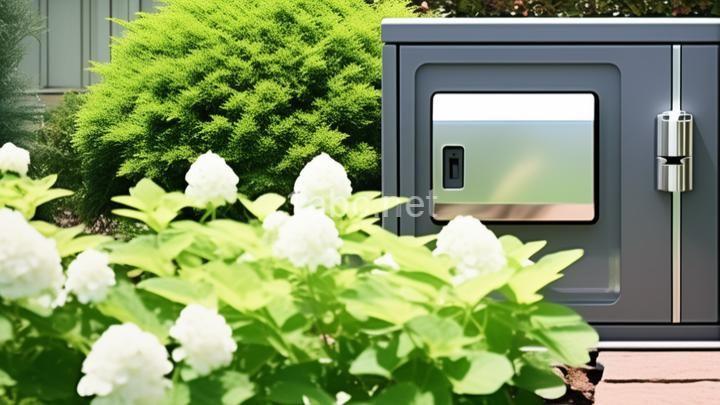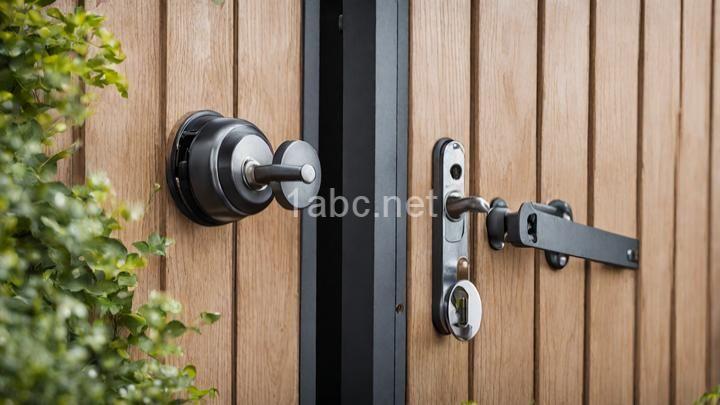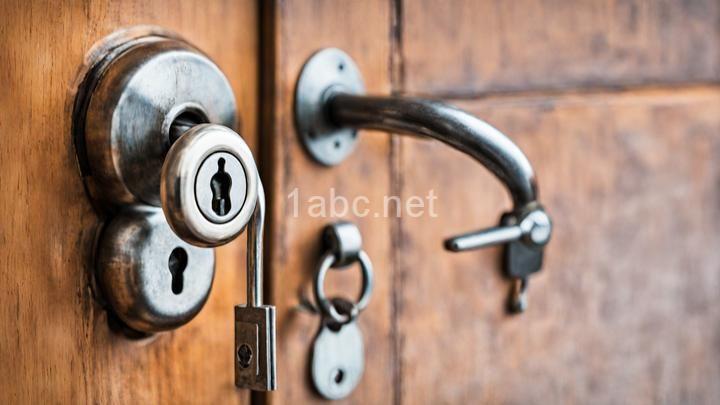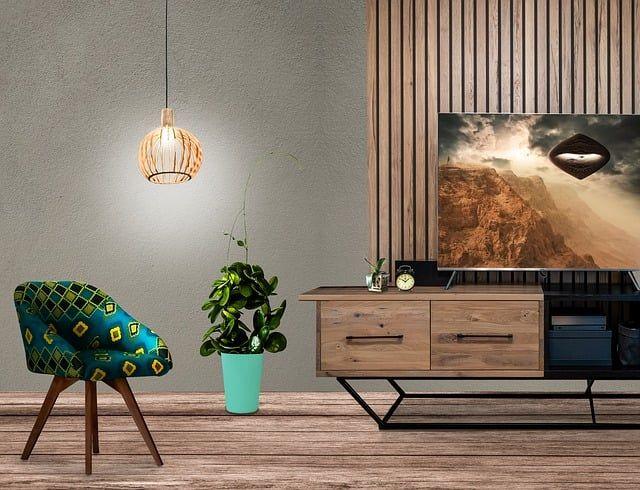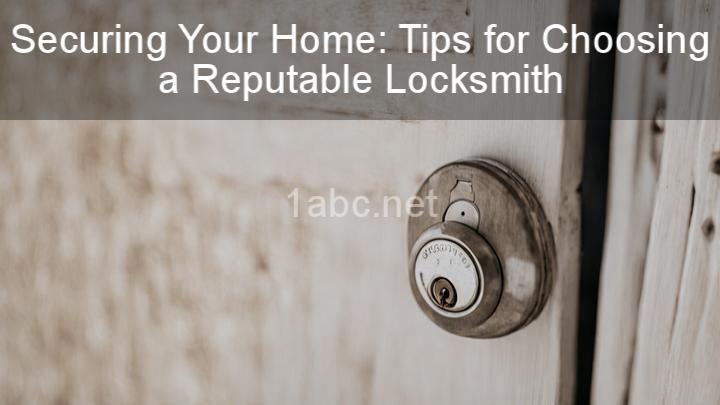Creating a Safe Haven: Tips for Securing Your Home's Entry Points
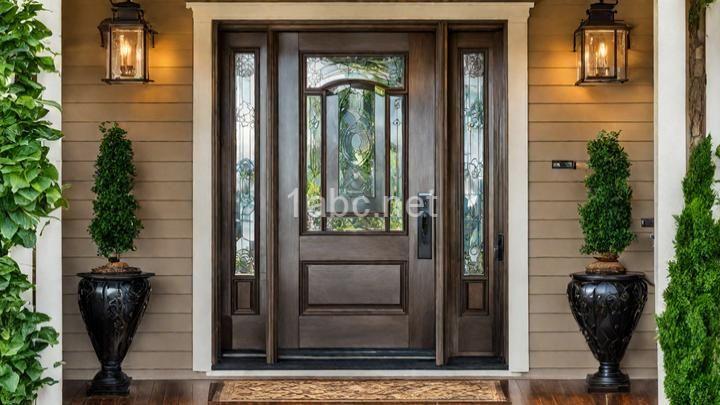
Introduction:
Welcome to our blog! We are excited to share some valuable tips on how to secure your home's entry points and create a safe haven for you and your family. Home security is a crucial aspect of ensuring peace of mind, and securing entry points is a great place to start. So, grab a cup of coffee and let's dive right in!
I. Assessing Vulnerabilities:
Before we can effectively secure our home's entry points, it's essential to assess the vulnerabilities present. Entry points can include doors, windows, and even the garage. Take a walk around your home and identify any potential weak spots. Are your locks sturdy? Do your doors have weak frames? By identifying these vulnerabilities, you can take the necessary steps to reinforce them.
II. Strengthening Doors:
Your doors are the first line of defense against intruders, so it's crucial to make them as secure as possible. Consider the material of your doors. Solid wood or metal doors are excellent options for strength and durability. Additionally, reinforcing the door frame and hinges can make it more difficult for someone to kick it down.
Installing deadbolt locks is another effective way to secure your doors. Deadbolts provide an extra layer of protection, as they are more resistant to forced entry compared to regular locks. For added convenience and security, you might also want to consider smart locking systems that allow you to monitor and control your doors remotely.
Don't forget about sliding glass doors and patio doors! These are often overlooked entry points but can be just as vulnerable. Installing a bar or rod in the track can prevent the door from being forced open. You can also consider adding a security film to the glass, making it harder to break.
III. Securing Windows:
Windows are another common entry point that requires attention. Start by ensuring that your windows have functioning locks. Sash locks or key-operated locks are great options to prevent intruders from easily opening them from the outside.
To reinforce your windows, consider adding security film or laminated glass. These options make it harder for someone to break the glass and gain access to your home. Basement windows and second-floor windows should not be overlooked either. Secure them with locks or bars to enhance their security.
IV. Fortifying Garage Security:
Many people overlook the garage as a potential entry point, but it's essential to secure it as well. Start by choosing a secure garage door opener that uses rolling code technology. This feature ensures that the code changes every time you open the door, making it difficult for intruders to gain access.
In addition to a secure opener, reinforce your garage doors with additional locks or braces. These provide extra support and make it harder to force the doors open. Don't forget about the windows in your garage. Keep them secure by installing durable locks or covering them with security film.
V. Outdoor Lighting and Landscaping:
Outdoor lighting plays a significant role in deterring intruders. Install motion sensor lights near your entry points to illuminate the area when someone approaches. This sudden burst of light can startle potential intruders and make them think twice about targeting your home.
Proper landscaping can also contribute to your home's security. Trim shrubs and trees near windows, creating clear sightlines and eliminating potential hiding spots. Consider planting thorny plants near ground-floor windows to deter anyone from attempting to climb through them. Gravel under windows can also make noise, alerting you to someone's presence.
VI. Alarm Systems and Security Cameras:
Alarm systems and security cameras are excellent investments when it comes to home security. Alarm systems act as a deterrent by sounding an audible alarm when an intruder tries to enter your home. Explore different types of alarm systems that suit your needs, such as those with motion sensors or remote monitoring capabilities.
Security cameras provide an extra layer of surveillance and can help identify potential intruders. Place cameras strategically around your property, focusing on entry points and vulnerable areas. Regularly maintain and clean your cameras to ensure optimal performance.
VII. Neighborhood Watch and Community Involvement:
Being part of a vigilant community can significantly contribute to your home's security. Consider joining or establishing a neighborhood watch program in your area. This allows you to collaborate with your neighbors in sharing security tips and information. By looking out for each other, you can create a strong network that deters criminals.
Remember to report any suspicious activities to the authorities promptly. Maintaining open lines of communication with your neighbors and local law enforcement is crucial in keeping your community safe.
Conclusion:
Securing your home's entry points is a vital step in creating a safe haven for you and your loved ones. By assessing vulnerabilities, strengthening doors and windows, fortifying the garage, enhancing outdoor lighting and landscaping, installing alarm systems and security cameras, and fostering community involvement, you can significantly improve your home's security.
We hope these tips have been helpful to you. Remember, your home is your sanctuary, and taking the necessary steps to secure it will provide you with peace of mind. So, go ahead and implement these strategies to create a safe and secure environment for you and your family.
Stay safe, stay secure, and until next time!
FREQUENTLY ASKED QUESTIONS
How can I improve the security of my home's entry points?
Improving the security of your home's entry points is crucial to protect your property and loved ones. Here are some steps you can take to enhance your home's security:
-
Install sturdy doors: Opt for solid core or metal doors for your entry points. These are more resistant to forced entry compared to hollow doors.
-
Reinforce door frames: Strengthen the door frames with metal plates and longer screws. This makes it harder for intruders to kick the door in.
-
Upgrade locks: Replace old and worn-out locks with high-quality deadbolt locks. Consider using smart locks that offer additional security features like keyless entry and remote monitoring.
-
Install peepholes and door viewers: These small additions allow you to see who is at your door without fully opening it. It adds an extra layer of security by providing visual confirmation before granting access.
-
Secure sliding doors and windows: Install a bar or rod in the track of sliding doors and windows to prevent them from being forced open. Adding a glass break sensor or window security film can also deter intruders.
-
Outdoor lighting: Illuminate your entry points and surrounding areas to eliminate dark spots. Motion-sensor lights are effective in deterring potential intruders.
-
Trim landscaping: Keep shrubs and trees near entry points well-maintained and trimmed. This prevents them from providing hiding spots for burglars.
-
Reinforce glass: For glass doors or windows, consider adding window film or laminated glass. These make it harder for intruders to break through.
-
Install a security system: Invest in a reliable home security system that includes cameras, motion sensors, and a loud alarm. Make sure it is professionally monitored for immediate response in case of an intrusion.
-
Practice vigilant habits: Remember to lock all doors and windows whenever you leave. Avoid leaving spare keys in obvious hiding places like under doormats or flowerpots.
By following these steps, you can significantly improve the security of your home's entry points and create a safer environment for you and your family.
Are there any specific types of locks that are recommended for securing entry points?
When it comes to securing entry points, there are several types of locks that are commonly recommended. One of the most popular options is a deadbolt lock. Deadbolts provide an additional layer of security due to their sturdy construction and the fact that they can only be unlocked with a key or by turning a knob from the inside. Another type of lock that is often recommended is a keyless entry system. These locks use a code or a fingerprint to grant access, eliminating the need for traditional keys, which can be lost or duplicated. Additionally, smart locks have gained popularity in recent years. These locks can be controlled remotely through a smartphone app and often come with features such as temporary access codes and activity tracking. It's important to consider factors such as the level of security required, personal preferences, and budget when choosing a lock for securing entry points.
What can I do to secure my windows and prevent break-ins?
To secure your windows and prevent break-ins, there are several steps you can take. Here are some suggestions:
-
Install window locks: Adding window locks is an effective way to enhance the security of your windows. There are different types of locks available, such as key-operated locks and sliding window locks. Make sure to choose the ones that are suitable for your window type.
-
Reinforce the glass: Consider reinforcing your windows with security film or laminated glass. These measures can make it more difficult for intruders to break the glass and gain access to your home.
-
Use window bars or grilles: Window bars or grilles can be installed as a physical barrier to prevent unauthorized entry. However, it's important to ensure that these bars or grilles can be easily opened from the inside for emergency situations.
-
Install window sensors: Another option is to install window sensors as part of a home security system. These sensors can detect if a window is being opened or broken, triggering an alarm and alerting you or a security monitoring service.
-
Secure basement and ground-level windows: These windows are often targeted by burglars due to their accessibility. Consider adding extra security measures such as window well covers, security bars, or reinforced glass to these windows.
-
Maintain visibility: Keep your windows clear of obstructions, such as overgrown bushes or trees, to improve visibility both from the inside and outside. This can deter potential burglars by eliminating hiding spots.
-
Use window security film: Window security film is a transparent adhesive film that can be applied to the inside of your windows. It helps to hold the glass together in case of breakage, making it more difficult for intruders to gain entry.
-
Install window alarms: Window alarms are small devices that can be attached to your windows. They emit a loud sound when the window is opened or tampered with, alerting you and potentially scaring off intruders.
Remember, securing your windows is just one part of a comprehensive home security plan. It's important to consider other measures such as proper lighting, a reliable alarm system, and ensuring all entry points are secure. By taking these precautions, you can help protect your home from break-ins.
Is it necessary to install security cameras around my home's entry points?
Yes, it is highly recommended to install security cameras around your home's entry points. Having cameras in strategic locations can provide an added layer of protection and peace of mind for you and your family.Security cameras act as a deterrent to potential intruders, as they are more likely to think twice before attempting to break into a property that is under surveillance. In the unfortunate event of a break-in, the footage captured by the cameras can serve as valuable evidence for law enforcement and aid in identifying the perpetrators.
By placing cameras at your home's entry points, such as the front door, back door, and garage, you can monitor who is entering and leaving your property. This can be especially useful in cases of package theft or suspicious activity.
Furthermore, security cameras can also help you keep an eye on your property when you are away. Many modern camera systems offer remote viewing capabilities, allowing you to check the live feed or recorded footage from your smartphone or computer. This can help you stay connected and ensure the safety of your home even when you're not physically there.
When choosing security cameras, consider features such as high-resolution video, night vision, motion detection, and the ability to store footage either locally or in the cloud. It's also important to position the cameras in a way that maximizes their coverage while respecting privacy boundaries.
In conclusion, installing security cameras around your home's entry points can be a proactive measure to enhance your home security. The presence of cameras can deter potential intruders, provide valuable evidence in case of a break-in, and allow you to monitor your property remotely.
